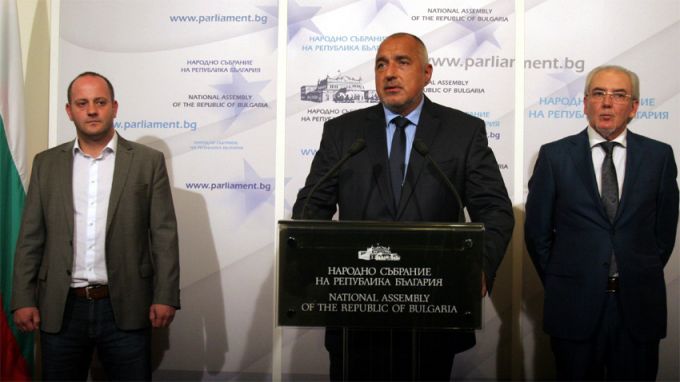
Today parliament was supposed to vote amendments to the constitution of Bulgaria affecting the judicial system. This was top priority for the Reformist Bloc. After it became clear the necessary constitutional majority would not be attained, Prime Minister Boyko Borissov intervened. The horse trading we had been witnessing for days on end or in other words “the calculations made in parliament using the slate-pencil” as Boyko Borissov put it, were going ahead with varying success. Amending the constitution makes sense if the changes envisage citizens’ control of the prosecutor’s office and the Supreme Judicial Council prosecution and also – if the term of office of the Supreme Judicial Council and the 7 year term of the prosecutor general, whoever he may be, were to be reduced. Premier Borissov thanked the reformists, the patriots, the Movement for Rights and Freedoms (MRF), the ABV, the Bulgarian Democratic Centre and his own party, GERB for having overcome their purely party prejudices.
“We took everyone into account, we took into account the compromises each one wanted and I am grateful for that”, said Prime Minister Borissov. “This is an exceptional signal to the nation, to Europe that we have political leaders, political parties that are able to overcome their egos when it is a matter of the state.”
A new draft for constitutional amendments is expected to be submitted to parliament today, with more than 180 MPs putting their names down to it. That would mean that in September the amendments to the constitution will take to the fast lane. What are the three points of consensus the MPs will put their names down to? They are: division of the Supreme Judicial Council, direct election of the magistrate quota of the Council and strengthening the powers of the inspectorate.
The new draft contains the identical text as the previous version pertaining to the proposal for the distribution of appointment quotas in the two bodies of the Supreme Judicial Council but the MPs will approach the Constitutional Court on this point. Radan Kunev from the Reformist Bloc explained that this does not mean a step back in the reforms:
“This does not mean mimicking a judicial reform. It is a full, comprehensive change, i.e. the most important item in the judicial reform programme and the constitutional draft is supported in its entirety and depth with regard to the Supreme Judicial Council’s powers as well as to the quotas of the individual bodies. It is not a matter of who stands to lose and who stands to gain here, but of all people who support the reform in the judiciary in Bulgaria and that is a resounding, an unexpected success.”
Movement for Rights and Freedoms leader Lyutvi Mestan:
“I think that the parties from the 43rd National Assembly showed that they have the will to place national interest above party egos. We made the difficult but right decision.”
Modest but from the heart, a way for the Movement to step back into the spotlight. The MRF will be part of the constitutional changes because it was ignored in the previous draft and will declare it is swerving to the right – a very shrewd move after the fiasco of its governance of the country, together with the Bulgarian Socialist Party. The Bulgarian Socialist Party and Ataka categorically opposed the amendments to the constitution. Socialist leader Mihail Mikov:
“There is one aim and one only – to shuffle and take over positions in the judiciary. But our European partners, the citizens of Bulgaria are not to be fooled. We are steadfast in our persuasion that the changes, the reforms in the judicial system require a much more serious approach than just collecting votes, or just recriminations and threats.”
The reform in the judicial system will give people more justice, provide greater stability of the system and will redistribute the spheres of political influence and the oligarchic circles that have created them. While the negotiations were taking place, hundreds of civic-minded citizens who had not lost all hope were having coffee next to the National Assembly building. Their aim was probably to remind the people inside that whatever was taking place there behind the words written on the façade of parliament building “Unity makes strength” it is bigger than simply handing power over to someone, it is a responsibility of exercising this power in “the name of the people”.
English version: Milena Daynova
''If the Constitution is not amended, there is no point in holding another election under the same rules and with the same bought, controlled and corporate vote'', the co-chairman of the parliamentary group of BSP-United Left Borislav Gutsanov said in..
The first sitting of the newly elected National Assembly has ended. As in the last three Bulgarian parliaments, the election of a speaker proved to be a serious challenge, as neither of the two candidates - Raya Nazarian of GERB-SDS and Andrei Tsekov of..
The residents of the Bulgarian-populated region of Taraclia and the Gagauz Autonomous Area in the Republic of Moldova voted over 90% "no" in the October 20, 2024, referendum, where Moldovan citizens were asked if they approved Constitutional amendments..
Pro-Russian candidate takes lead in first round of presidential election in Romania In a shock development, independent far-right, pro-Russia..

+359 2 9336 661
